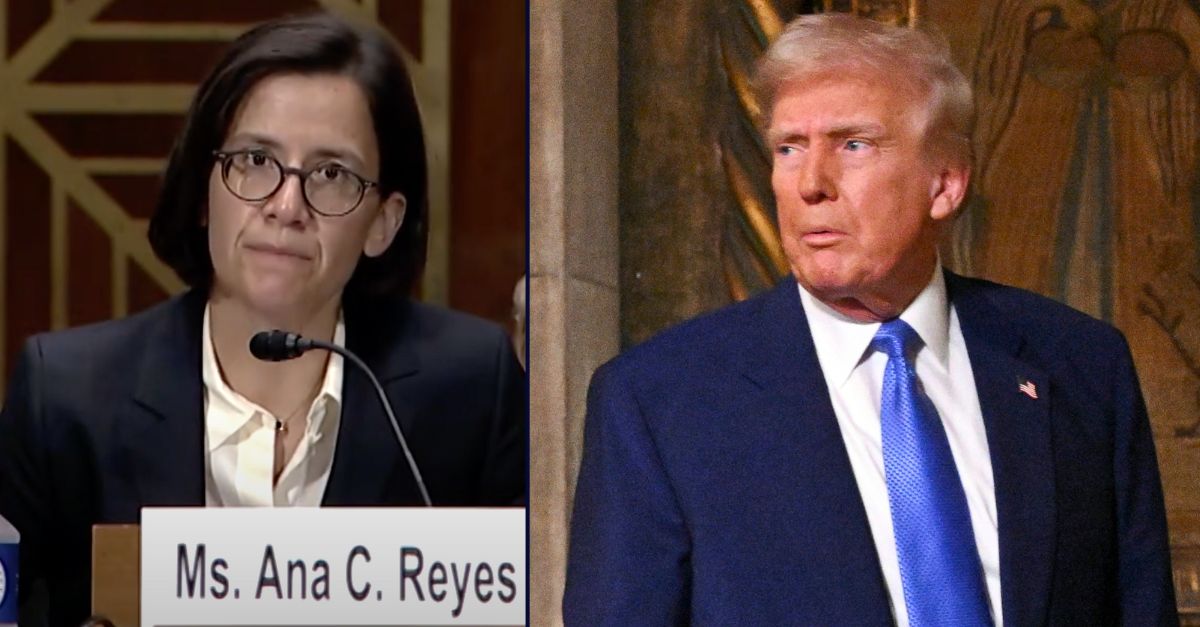Attorneys representing members of the armed forces appeared in court this week to push for a pause on the Trump administration’s transgender ban.
While resolution appeared dim for either side, the U.S. Department of Justice was decidedly shocked and awed by a barrage of courtroom lectures from the judge overseeing the matter... Continue reading here ▶
During the Tuesday hearing, U.S. District Judge Ana C. Reyes, a Joe Biden appointee, expressed multiple large measures of skepticism over several basic propositions made by the government.
On Jan. 28, lead plaintiff Nicolas Talbott and seven others filed their complaint with the U.S. District Court for the District of Columbia. The lawsuit alleges the ban on transgender service members violates the Due Process clause of the Fifth Amendment by discriminating against people “based on their sex and based on their transgender status.”
At the hearing, which lasted nearly the entire day in a Washington, D.C., courtroom, Department of Justice attorneys frequently found themselves on the losing end of questions — rhetorical and interrogative — and matter-of-factly delivered skepticism.
After finding some common ground on two baseline issues, the judge expressed a certain level of perplexity at an apparently incongruous statement by the government’s lawyers.
The source of the ban is Executive Order 14183, which is described as an effort to “ensure the readiness and effectiveness” of the U.S. armed forces. Signed by President Donald Trump, the order is aimed at thinning the military’s ranks of individuals who identify as a gender different from their assigned sex at birth. Similar to an earlier anti-transgender executive order, the military focused policy excoriates “radical gender ideology.”
But on Tuesday, however, DOJ attorney Jason Lynch argued the executive order does not actually bar all transgender people from serving, according to a courtroom report by Politico reporter Kyle Cheney. The government lawyer argued the Pentagon could, in fact, use discretion to craft a policy that might not apply universally.
“I don’t think the secretary of defense has a lot of ambiguity in his mind as to what the executive order clearly requires,” Reyes shot back, according to NBC News.
The judge noted that Defense Secretary Pete Hegseth immediately issued across-the-board pauses on transgender people joining the nation’s fighting forces as well as pauses on what treatments military health insurance would cover.
The DOJ attorney replied back to say that there are a plethora of ancillary documents that advise restraint, according to Military.com.
“Every guidance document that we have filed with the court talks about pausing, waiting, holding on, there’s more guidance coming, don’t do anything yet,” Lynch said.
Still, the judge was not convinced.
“If we had President Trump here right now, and I said to him, ‘Is this a transgender ban?’ What do you think he would say?” Reyes asked, according to ABC News.
To which Lynch replied: “I have no idea, your honor.”
The judge retorted: “I do. He would say, ‘Of course it is.’ Because he calls it a transgender ban, because all the language in it is indicative.”
Several such exchanges went down in similar fashion.
At one point, the judge asked Lynch to explain how the use of pronouns would impact military readiness or capability.
The lawyer essayed a quick: “I don’t —”
But Reyes immediately cut him off.
“Because it doesn’t,” the judge said, according to the Washington Post. “We all have a lot bigger problems than pronoun use. We have a military that is incompetent, if that is the case. Any common sense rational human being knows that it doesn’t.”
The jurist went on like this, at length:
It is pretext. It is frankly ridiculous. If you want to get me an officer of the U.S. military who is willing to get on the stand and say that because of pronoun usage the U.S. military is less prepared [ …], I will be the first to give you a box of cigars.
The underlying litigation explains that “President Trump made animosity towards transgender individuals a cornerstone of his campaign for a second term.”
Reyes picked up that thread on Tuesday.
“[The executive order] calls an entire category of people dishonest, dishonorable, undisciplined, immodest, who lack integrity, people who have taken an oath to defend this country, people who have been under fire, people who have received medals for taking fire for this country,” the judge said. “I want to know from the government whether that language expresses ‘animus.’ Does that express animus?”
Lynch, again, tried to answer in earnest, but, again, that was not what the judge was looking for.
“Not in any constitutional —” he began
Another harangue emanated from the court followed, according to Politico.
“In a common sense way,” the judge interjected. “This is a policy from the President of the United States affecting thousands of people … to call an entire group of people, lying dishonest people who are undisciplined, immodest and have no integrity. How is that anything other than showing animus?
The DOJ attorney replied: “I don’t have an answer for you.”
Reyes was not having it and offered another verbal fusillade: “You do have an answer, you just don’t want to give it.”
The court concluded the marathon proceedings with no ruling — scheduling further argument over a requested preliminary injunction for Wednesday.
